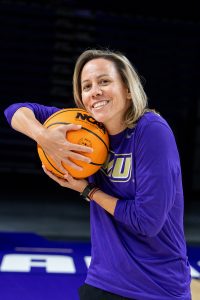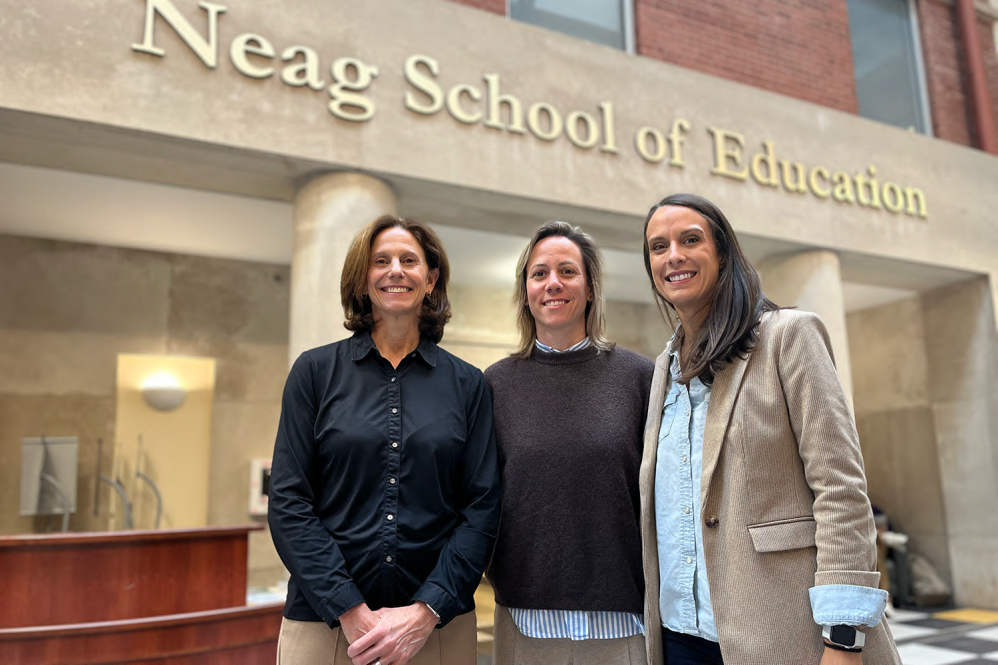Each year, the U.S. Department of State, the Center for Sport, Peace, and Society at the University of Tennessee, Knoxville, and espnW co-sponsor the Global Sports Mentoring Program (GSMP), a leadership initiative that empowers women to advance gender equity through sport. In 2025, GSMP paired 14 emerging female leaders from around the world with executives and experts in the U.S. sports industry.
The UConn Neag School of Education’s Sport Management Program welcomed Serbian coach and advocate Jelena Pavićević, who was mentored by professor and associate dean for academic affairs Laura Burton and assistant professor-in-residence Danielle DeRosa. This marked the program’s ninth year participating in the Global Sports Mentoring Program, facilitating connections between eight women using sport to enact change across the globe. The Sport Management Program hosted Pavićević from Oct. 19 to 25.
Pavićević’s path in sport began as a track and field athlete when she left her small hometown for Belgrade to pursue better training and education. After earning a degree in sport education and becoming a coach, she found her calling in creating opportunities for girls who rarely have the chance to play.
Pavićević did not grow up in a family of athletes; most of her relatives work in medicine or pharmacy. Her inspiration came in college when she met Marina Maljković, the coach of the Serbian women’s national basketball team. That mentorship helped her see coaching as a way to change lives.
“I started to feel what it is to be a coach — how to help others find a better life, better opportunities,” Pavićević says. “That became my passion.”
I started to feel what it is to be a coach — how to help others find a better life, better opportunities. That became my passion. — Jelena Pavićević
In 2015, she co-founded the Marina Maljković Movement, which offers free basketball instruction to girls ages 7 to 14. The program grew into the Women’s Sport Institute in Serbia, operating in 25 cities, supporting 20 sports, and engaging 50 coaches who work with about 7,000 girls. The focus, Pavićević says, is not on elite talent but on making participation accessible for every girl who wants to try a sport.
The programs run for 10 months each year and combine noncompetitive sport with life-skills workshops led by coaches, medical staff, and psychologists. Families receive what they need — access to gyms, jerseys, and caring coaches — free of charge.
“We try to remove every excuse not to come,” Pavićević says.
A recent internal survey found that 60% of participants were playing organized sport for the first time, and more than 80% of parents reported positive changes in their daughters’ energy, confidence, and initiative. “We use sport as a tool. We see girls becoming braver — on the court and off,” she says.
Pavićević notes that Serbia’s club-based system often limits opportunities for girls because families have to pay fees and travel long distances. In many rural areas, facilities are scarce and stereotypes about which sports are “for girls” persist. Some of her participants travel up to 50 kilometers (over 31 miles) to attend practice.
“You cannot imagine their happiness,” she says. “For them, it is an opportunity.”

Her GSMP mentorship was a collaboration between James Madison University and UConn, offering an immersive experience across two campuses and access to five mentors. After spending the first weeks at JMU, Pavićević joined the Neag School for a focused residency with Burton and DeRosa.
“We are so pleased to continue our involvement in this exciting and meaningful program,” Burton says. “GSMP has had such a positive impact on the lives of girls and women around the world, and we were lucky to play a role in support of the program. Pavićević is a natural fit with us here at UConn, as she leads an impactful sport institute in Serbia, designed to positively impact the lives of girls and women through sport and physical activity.”
“Our participation in GSMP is powerful and facilitates a reciprocal relationship,” DeRosa says. “Our students and faculty get the opportunity to learn about sport in a context different than the U.S., and we get to spend time with Jelena helping her to refine her work in Serbia. It is truly a win-win.”
DeRosa adds that the exchange highlights UConn’s commitment to global engagement and community-based sport leadership.
During her time in the United States, Pavićević developed a mentorship framework for coaches across her institute’s 25-city network. Her plan embeds short, coach-led lessons on confidence and leadership into regular practices, helping girls build trust and skills in a familiar environment.
“Because they want to be there, the gym becomes a safe space very quickly,” she says. “Within a few practices, they’re asking questions, trying new things, and participating more in school and at home.”
She also explored how research-informed practices could strengthen her organization’s sustainability.
“The preparation here is impressive,” she says. “At every level, from youth to university, there are systems that support learning. If I can implement even 1% of what I’ve seen here, I will be super happy.”
For Pavićević, visiting UConn — home to one of the most celebrated women’s basketball programs — was especially meaningful.
“I feel supported in every conversation, even with people I have just met,” she says. “It’s an amazing experience.”
Through GSMP, UConn students and faculty are connected to a global network that includes the U.S. Department of State, the University of Tennessee, and espnW. These partnerships open doors for students to participate in conferences, events, and championship programming.
Our students and faculty get the opportunity to learn about sport in a context different than the U.S., and we get to spend time with Jelena helping her to refine her work in Serbia. It is truly a win-win. — Danielle DeRosa
Throughout the third week of October, Pavićević spent time with sport management faculty and athletics staff at UConn to learn more about the context of sport in the U.S., nonprofit development and social entrepreneurship, and gender and leadership development in sport. She also attended UConn’s Sport and Human Rights Summit, hosted by the Dodd Center for Human Rights.
“Being part of GSMP is a team effort at UConn. We are so grateful to the faculty in the Neag School, partners in UConn Athletics, and the greater UConn community for embracing this project and helping Jelena to feel connected to UConn,” DeRosa says.
Since 2012, GSMP has collaborated with more than 80 U.S. mentor organizations and 334 American business and sport executives, creating lasting bonds that showcase the power of American innovation, entrepreneurship, and leadership.
Pavićević will return to Serbia with a notebook full of ideas, a draft mentorship framework, and a renewed commitment to sustainability — hoping to expand her program to more cities, support more coaches and girls, and deepen family engagement.
“We cannot change a whole family in four or five days,” she says. “That is why our programs run almost year-round, and why we keep going, again and again. I want every girl in Serbia to be able to play sports. Maybe that’s not possible. But you never know.”



